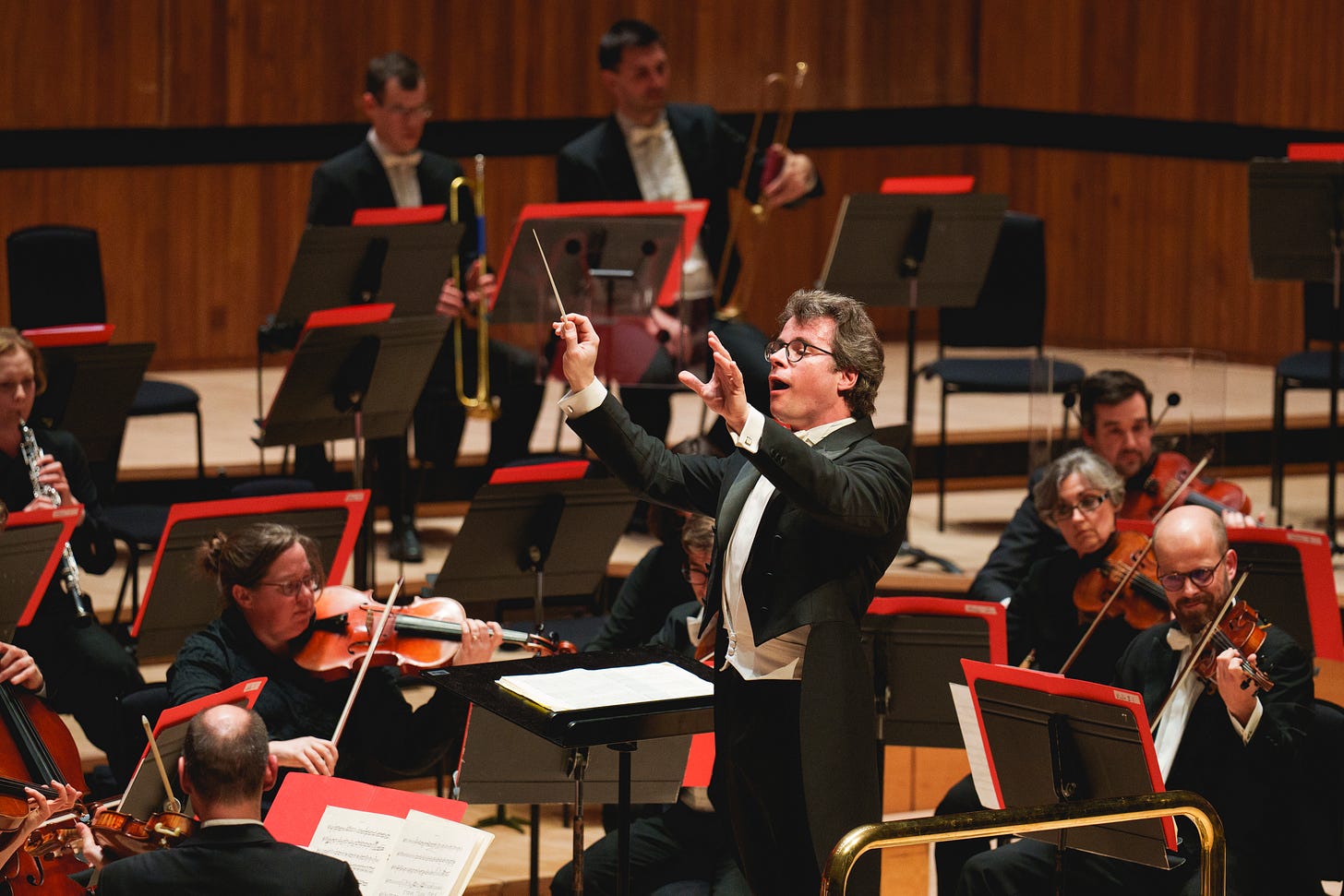Lyrical Ecstasy Escapes the Gods: Jakub Hrůsa’s Superhuman Feats at Royal Festival Hall
Capsizing the notion that confines art to the past, the maestro reignited beauty’s embers in divine displays of Beethoven and Voříšek - defying human limits in the process.
Jakub Hrůsa at the baton of the Philharmonia Orchestra. Credit: Andy Paradise/Royal Festival Hall
Coruscating in their coats of burnished bronze, collaborating scribes Goethe and Schiller stand atop a pedestal extending a shared laurel wreath in Weimar, Germany. Creased trousers grace their flexing knees: sartorial flaws conspicuous in a famed monument to trimmer times. Resistant to attrition in the form of two World Wars, corrosive cyclones and a set of U.S. replicas inclined to steal their thunder, they remain unstruck by time’s stampeding feet; patina’s tinct the sole betrayer of their age.
Performance forms the only art imperforable to nature’s rage. While paper parches and paint crisps and chips; descending cups drain long-dried ink and books boast broken spines, the incarnations of a play or piece risk wear and tear as much seas’ incapturable crests: outcrops of nature bent ironically on its defiance.
Bevelling the beams across its arches, Jakub Hrůsa’s musicmaking houses details more refined than a cathedral’s rafters; sculpting bars across composer’s scrolls with filigree amiss in modern effigies. In a concert that combined Beethoven’s Choral Symphony with a vignette of his compatriot Voříšek – the Symphony in D – Hrůsa and the Philharmonia Orchestra were quick to challenge our capacity to separate the earthly from the intricately crafted; fruits of labour from their offshoots.
Diminuendos across woodwind grew as dulcet as a cloak of dew amidst a misty morning at the dawn of Voříšek’s D-major opus. Subtle increments of increases in sound mimed petals shedding raindrops with the volume’s looming luminosity. As vicious violins unleashed arpeggios spiralling like winding staircases, staccato by the double basses split them into punctuated storeys. Throbbing cellos could have been the gallops of a gracious stallion – or a chime that rivalled ticks along a clocktower; a waltz’s box steps in the final movement seemed to emulate the pleats around a Silver Age’s crinoline. Fauna and fabric figured equally in a mimesis of both specialties and species.
Deigning to inveigh against man’s vulnerability, Hrůsa’s conducting of the Choral Symphony – Beethoven’s last – put him on par with daredevils. Determined was the maestro to depict all manner of phenomena as instrumentalists presented a precision insurpassable; a flawlessness to flout the talents of the gods. Pizzicato plucks on cello showcased a plum’s suppleness in the first movement while the gradual crescendo and diminuendo flights of strings seemed as symmetrical as bow-shaped satin in a napkin ring. Equidistant intervals diced crotchets on the strings across the second movement till a monstrous forte trumpeted a beastly storm.
“Adagio molto e cantabile” – the third instalment of the masterpiece – snatched this celestial instability to welcome vivid daydreams. Sunlight’s liquid gold serenely melted into morning’s silver as the first strings languished in legato; soaring like a starling in a swarm of programmed flight. By the last section – the illustrious “Ode to Joy” – a half-arc of a rainbow had appeared to split the first and second strings into disparate textures; soldering the shades as slickly as a jeweller.
Bass Solomon Howard dealt his part a potent (if comparatively rocky) rendering while Hanna Hipp’s soprano straddled strain throughout her solo but these defects appeared meaningless against a mammoth choir cherishing meticulousness. Melding like conjoining atoms, members of the Crouch End Festival Chorus fused in stunning synchronicity; inflaming listeners with fervour as the concert sought its climax.
Fearless in the face of juggernauts that floor too many of his peers, conductor Jakub Hrůsa’s baton shelters an antenna to the heavens. His is an art that offers blueprints for euphonic architecture, dealing blows to treatises on dying beauty.




